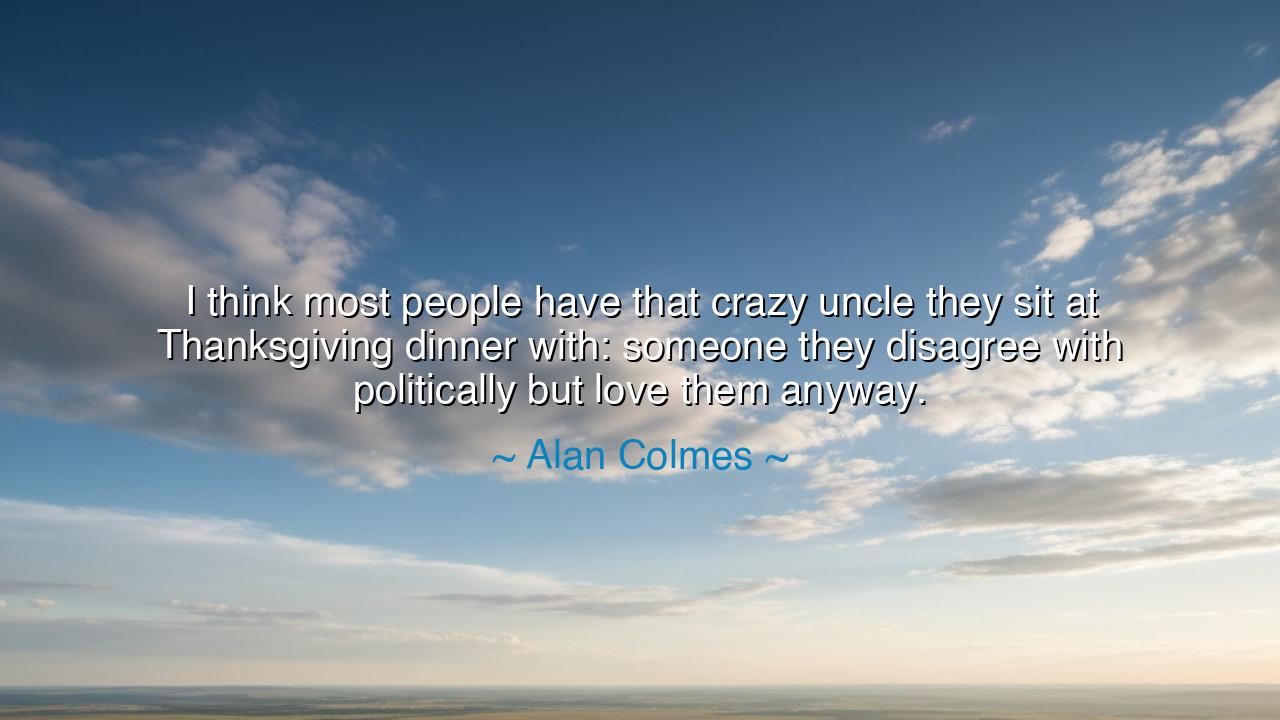
I think most people have that crazy uncle they sit at
I think most people have that crazy uncle they sit at Thanksgiving dinner with: someone they disagree with politically but love them anyway.






Alan Colmes once declared with a touch of humor and a depth of truth: “I think most people have that crazy uncle they sit at Thanksgiving dinner with: someone they disagree with politically but love them anyway.” What seems a jest about family feasts is in fact a profound lesson about human fellowship. For in the circle of kin, as in the greater circle of humanity, there will always be discord in thought and in creed. Yet love, stronger than the clash of opinions, binds us together.
The origin of this saying comes from Colmes’s own life as a political commentator, one who walked often between opposing sides. Known for his debates and disagreements, he also understood that life is not lived only on the stage of ideology. At the hearth, at the table, where bread is broken and stories are shared, the ties of blood and affection endure beyond the shouting of politics. Thus, Colmes spoke not only of an uncle, but of a universal truth: we must learn to sit with those who see differently and still honor the bond of love.
In the annals of history, one finds countless examples where families and nations divided by belief still clung to love. Consider the tale of the American Civil War, where brother fought against brother, and yet, even on the battlefield, stories abound of soldiers crossing lines to comfort their kin. The tragedy of that age revealed the danger of letting division outweigh affection. Colmes’s Thanksgiving table is the gentle counter-vision: not brothers at war, but kin gathered in disagreement, yet choosing laughter over bitterness, affection over enmity.
The crazy uncle, then, becomes more than a character; he is a symbol of the irreducible complexity of love. We may shake our heads at his words, feel fire rise in our veins when he speaks, yet still we carve the turkey with him, still we pass him the bread, still we embrace him at the end of the night. This is not weakness—it is the triumph of the heart over the fractures of thought. For what is family, if not the covenant to endure with one another even when the mind rebels?
The lesson extends beyond the family table. In our age, nations are like families, divided into factions, shouting across the table of the world. Yet if kin can choose to hold love above politics, so too can societies. The ancient Greeks, though fierce in debate within the Agora, still knew the value of fellowship in the symposium. The Native American councils brought together voices of many tribes, teaching patience in listening before decision. History teaches: we need not destroy what we disagree with; we can honor it, love it, even while resisting its ideas.
The wisdom, therefore, is this: do not let disagreement eclipse love. Political battles, religious quarrels, personal differences—these will never cease. But to love even the one who frustrates you, to embrace the one whose words ignite anger, is to live the higher law. When you sit at your own tables, resist the temptation to let discord poison the feast. Instead, laugh, share, listen, and remember that every person carries the spark of humanity, even the so-called “crazy uncle.”
So, O listener, take this counsel into your life. When you find yourself at the table of division, do not rise in wrath, nor close your heart in disdain. Break bread with those you disagree with, speak with kindness, and when the night ends, let your parting be in love. For it is love that endures when opinions fade, and it is love that binds the generations. Thus Colmes’s light-hearted teaching becomes a timeless command: disagree fiercely, but love anyway. This is the way of wisdom, the way of peace, the way that turns a house into a true home.






AAdministratorAdministrator
Welcome, honored guests. Please leave a comment, we will respond soon